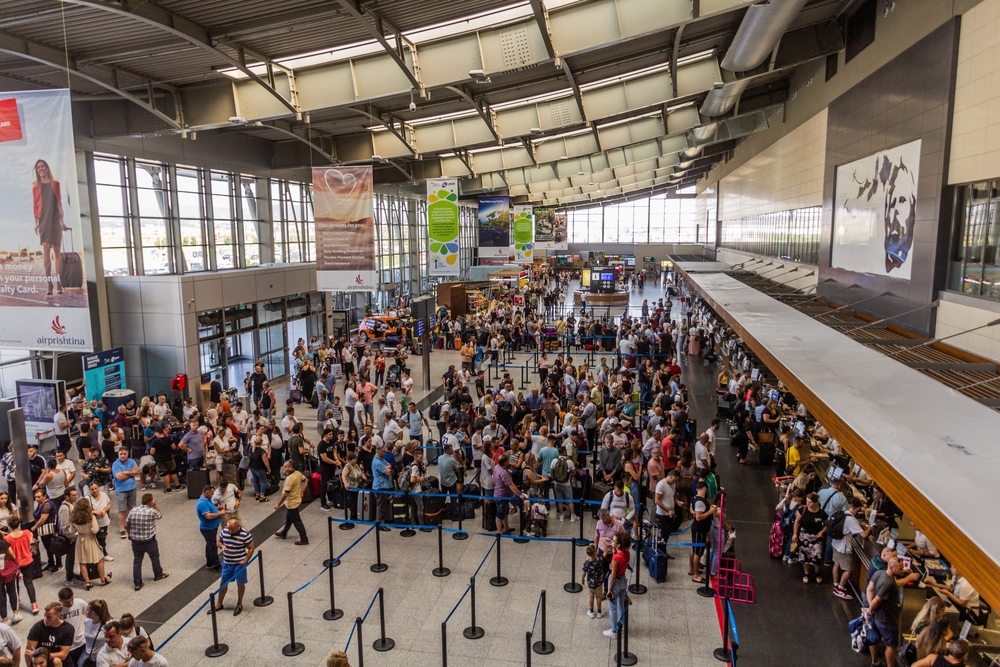
Aeroporto di Pristina - © Matyas Rehak/Shutterstock
Last in the Western Balkans, from the beginning of 2024 Kosovar citizens can travel without a visa in the Schengen area. A long-awaited opportunity already used by thousands of people, and viewed with extreme interest by Kosovar business
"Let's ski visa-free" is an Instagram post featuring a picture of Dea Nikqi, a young Kosovar from Prishtina, who travelled for the first time for her winter vacation without needing to get a visa. After some thought, she chose the Bulgarian mountains.
"It has been an amazing feeling. I have travelled also when a visa was needed, but the process was so difficult and expensive, and you would never know whether you would eventually get the visa or not", she told OBCT.
Since January 1st, after a long wait, Kosovo citizens can finally travel to the Schengen area without requesting a visa for 90 to 180 days. The proposal had been approved by the EU in April 2023.
Kosovo citizens can now travel visa-free to 34 countries, including EU countries and other countries who are not part of European Union but are still part of the Schengen zone, such as Island, Lichtenstein, Norway and Switzerland, and four smaller states such as Vatican, San Marino, Monaco and Andorra.
In three weeks, it is estimated that over 20,000 Kosovo citizens went to Greece, making Greece and Bulgaria the two most visited countries for this period.
In the meantime Spain, one of the five EU countries that do not recognise Kosovo as an independent state, decided to recognise Kosovo's passport, as communicated to the public by Kosovo's deputy Prime Minister Besnik Bislimi on January 6th.
According to the European Commission , starting from January 1st, 2024, Spain recognises ordinary passports issued by Kosovo. "This change does not constitute, by any means, an official recognition of Kosovo as an independent country by Spain", the document on the European Commission page says.
First time abroad without a visa
Ilire Novosella might be among the first Kosovar citizens who entered Spain after Madrid recognised the Kosovo passport. "This is the first time we came to Barcelona, we travelled from Tirana airport, and we did not encounter any problem at the gate border. Before it was impossible because Spain did not recognise our passport”, said Novosella while still in Barcelona.
After neighbouring Balkan countries were admitted to the Schengen “white-list” more than a decade ago, Kosovo citizens were the only ones left out even after fulfilling all technical criteria since 2018.
The vast amount of money spent to get a visa – approximately 118 million Euros only in the past eight years – and the problematic application procedures were a huge burden for Kosovars wishing to visit Europe or their loved ones living there. In many cases, visas were denied, causing trouble for many Kosovars.
For example Petrit Carkaxhiu, a well-known musician and composer from Kosovo, could not travel to Brussels in 2011 to participate in the Balkan Traffic Festival because of issues with the visa.
"Due to the degrading visa application procedure, in the last ten years we lost any interest in participating in artistic or music festivals in Europe", Carkaxhiu told OBCT. “However, we are happy for the young citizens who will not experience the humiliation that we have as a generation”, he added.
Visa liberalisation, a catalyst for economic growth
Visa liberalisation turned out to be a significant decision in both political and economic terms. Government officials highlight that Kosovo's European perspectives are now stronger. Additionally, it offers business opportunities to those who are prepared to grab them.
The German-speaking world is a region of high interest for Kosovo companies, also because of the large number of Kosovo emigrants living there. A recent report remarks that over 520,000 people from Kosovo live and work in Germany, Austria and Switzerland. According to the Kosovo Central Bank, remittances reached 260 million Euros in 2022.
"Kosovar companies can now explore new markets and expand their consumer base across borders more easily. I believe that this will lead to increased exports, new partnerships and market diversification", Nora Hasani, director of the German-Kosovar Business Association, told OBCT.
She is specifically looking forward to increasing trade with Germany, a country where many Kosovo emigrants live and work.
"As the German-Kosovar Business Association (KDWV-OEGJK) we have shifted our focus to organising more activities in Germany", Hasani said, adding that there are workshops in the pipeline on the German Supply Chain Due Diligence Act and ESG and ISO certification and procedures, which will become increasingly more important for Kosovar companies if they want to become suppliers for German buyers.
Regarding workforce migration concerns, Hasani emphasises that legal emigration procedures remain in place which can vary across states.
For over a decade, the German-Kosovar Business Association has supported the Kosovo government in creating better policies and legal frameworks for attracting investors, showcasing the country as a promising destination for investment and cooperation.
"While the past decade may have presented challenges, the future holds promise. Kosovar companies need to embrace the opportunities that come with a more open and collaborative economic environment", Hasani told OBCT.






